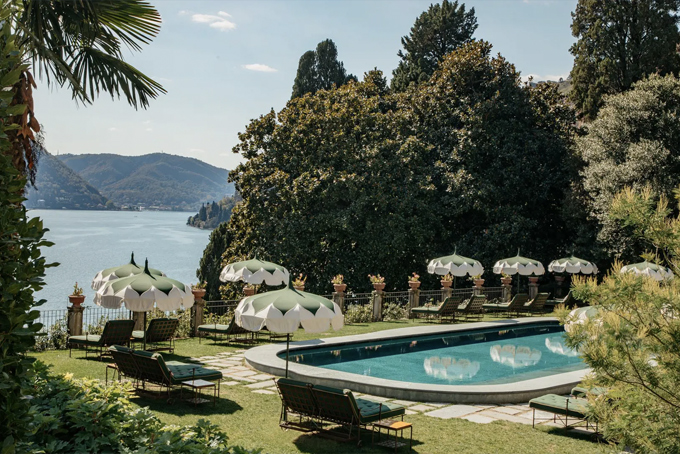There are many great hotels in the world. In fact, there are a few thousand of them—according to one estimate, there are over 4,400 four and five-star properties across the globe. But one place has now, officially, topped the list: Passalacqua.
On September 19, the prestigious World’s 50 Best Organization named the Lake Como villa as the World’s Best Hotel for 2023. It was a triumphant accolade for any lodging—but especially for the boutique Passalacqua, which boasts only 24 rooms and opened in June 2022. “Lake Como at its most glamorous and luxurious with a hint of bohemianism,” read the organisation’s inspection note.

In 2018, Valentina De Santis and her family—also the owners of nearby Grand Hotel Tremezzo—purchased the spectacular estate from an American couple. The De Santises recognised that a place like Passalacqua wasn’t meant to be private, and decided to transform it into a boutique hotel with a very specific vision: “We already had in mind the idea of bringing back the villeggiatura, a kind of vintage style of holiday where everything is much more low key pace, where you really appreciate the small things in life,” she says.
Last summer, I had the opportunity to stay at Passalacqua and experience the exact kind of villeggiatura De Santis described. The moment arrived on a sweltering summer afternoon, jet-lagged and in wrinkled clothing, I already knew how lucky I was. The reception room alone felt like the living room of a close—albeit impossibly chic—friend. It was swathed in a warm pear green and a cheerful fig leaf plant sat in the corner. A Murano glass chandelier hung from a pointed ceiling. (We wanted that this feeling of being at home, so we took away a lot of the basic elements of a hotel, says Desantis.) Jars of candy sat on a Breccia Pontificia marble mantle, flanked by antique objets d’art. In the next room over, a bar was home to several plushy loveseats, while the kitchen held an island filled with cakes, fruit bowls, smoked salmon, and freshly baked breads for breakfast.

It stands upon lakefront land owned by Pope Innocent IX, who ruled over the Vatican for a mere two months in 1591. In the early 1800s, Count Andrea Lucini Passalacqua built a sprawling villa complete with interiors by famed Swiss designer Giocando Albertolli. It was known as one of the grandest properties in the region: in 1829, Vincenzo Bellini composed two of his famous operas, Norma and La Sonnambula, in the home’s music room. The owners changed over the centuries, each bringing in their fair share of notable guests, from Napoleon Bonaparte to Winston Churchill.
Throughout the property, neoclassical magnificence combines with modern touches: rooms feature ten-foot tall (or 16-foot, in the case of the Salla de Musica suite where Bellini composed those aforementioned operas) Barovier & Toso Murano glass chandeliers—but also have Dyson hairdryers. A gym with state-of-the-art treadmills sits amid an olive grove. Vintage-style steamer trunks by Bottega Conticelli conceal flatscreen televisions. Some rooms feature carefully restored frescos, and the pool has upholstery by La Double J’s JJ Martin. A spa is attached to a secret tunnel that leads out to the lake, used once upon a time as a passageway by servants. Meanwhile, the hotel’s classic wooden boat, “Didi,” is swathed in Loro Piana fabrics, and hotel employees are dressed in uniforms designed by cult-Italian cool girl brand Giuliva Heritage.

It’s also a love letter to the artistry of Italy: curtains are made from taffeta sourced in Como, and gilded mirrors come from Venice’s family-run Barbini. Couches and chairs feature textiles by Rubelli, while bedroom floors are laid with traditional Cotto Lombardo tiles. De Santis says she always wanted to imbue Passalacqua with “vivere Italiano.”
Passalacqua’s intimate rooms spread between the main villa, converted stables, and the four-bedroom Casa Al Lago. De Santis shares that often, guests have an emotional reaction to walking into the rooms, some of which have frescos, painted ceilings, and ornate Baroque touches. “You don’t know how many times our team escorted the guests to the rooms and they started to cry,” she says. “I think it’s a place that really taps into emotions because my interpretation is that they not only see the beautiful pieces and furniture, but they feel the love and passion that’s behind it.”


Indeed, it is perhaps the only hotel where I’ve noticed guests willingly conversing with each other, inquiring about each other’s suites—mine, I shared during my visit, was bathed in Turkish and royal blues—or what wine to order with lunch. After all, despite arriving from all over the world, we all had one common: the jewel box upon the lake we now find ourselves in.
Book a stay here.
This article was originally published on Vogue.com.





